Sabatinca calliarcha is a species of moth belonging to the family Micropterigidae. It was described by Edward Meyrick in 1912. It is known from New Zealand.
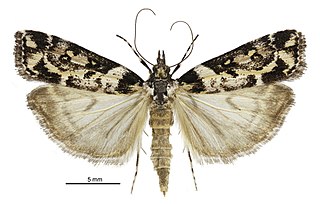
Eudonia diphtheralis is a species of moth in the family Crambidae. It is endemic to New Zealand.

Cosmopterix abnormalis is a moth of the family Cosmopterigidae. It is known from the Cayman Islands, Haiti and Jamaica.
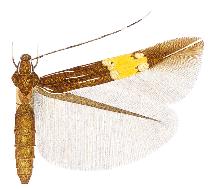
Cosmopterix astrapias is a moth of the family Cosmopterigidae. It is known from the United States, Argentina, Costa Rica, Jamaica, Mexico (Tabasco) and Puerto Rico.

Cosmopterix galapagosensis is a moth of the family Cosmopterigidae. It is known from the Galapagos Islands.
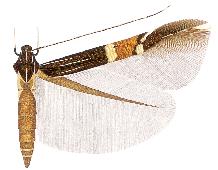
Cosmopterix karsholti is a moth of the family Cosmopterigidae. It is known from Peru.

Cosmopterix lespedezae is a moth of the family Cosmopterigidae. It is known from the United States.

Cosmopterix scirpicola is a moth of the family Cosmopterigidae. It is known from the United States, where found from Maryland and eastern Wyoming to Florida, south-western Louisiana and California. It has also been recorded from Alabama.
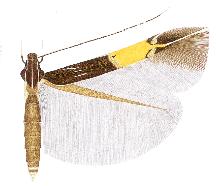
Cosmopterix teligera is a moth of the family Cosmopterigidae. It is known from the United States, Brazil, Colombia, Costa Rica, Cuba, Jamaica and Mexico (Tamaulipas).

Cosmopterix xanthura is a moth of the family Cosmopterigidae. It is known from Mexico (Tabasco). Adults have been recorded in March.

Pebobs kale is a moth of the family Cosmopterigidae. It is known from Peru and Trinidad and Tobago.
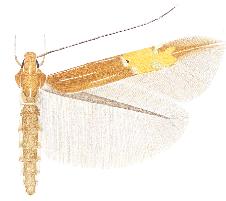
Pebobs sanctivincenti is a moth of the family Cosmopterigidae. It is known from Grenada and Saint Vincent and the Grenadines.
Brenthia pleiadopa is a species of moth of the family Choreutidae first described by Edward Meyrick in 1921. It is found in Magude, Mozambique.
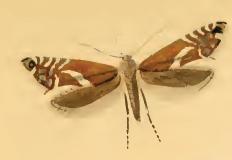
Glyphipterix haworthana, Haworth's glyphipterid moth, is a moth of the family Glyphipterigidae. It is found in most of Europe, as well as North America.
Helcystogramma bicuneum is a moth in the family Gelechiidae. It was described by Edward Meyrick in 1911. It is known from north-eastern India and China.
Helcystogramma gradatum is a moth in the family Gelechiidae. It was described by Edward Meyrick in 1910. It is known from north-eastern India.
Cosmopterix macroglossa is a moth in the family Cosmopterigidae. It was described by Edward Meyrick in 1913. It is found in South Africa.
Telphusa smaragdopis is a moth of the family Gelechiidae. It is found in Costa Rica.
Antaeotricha chilosema is a moth in the family Depressariidae. It was described by Edward Meyrick in 1918. It is found in French Guiana.
Imma chasmatica is a moth in the family Immidae. It was described by Edward Meyrick in 1906. It is found in the Indian states of Sikkim and Assam.
